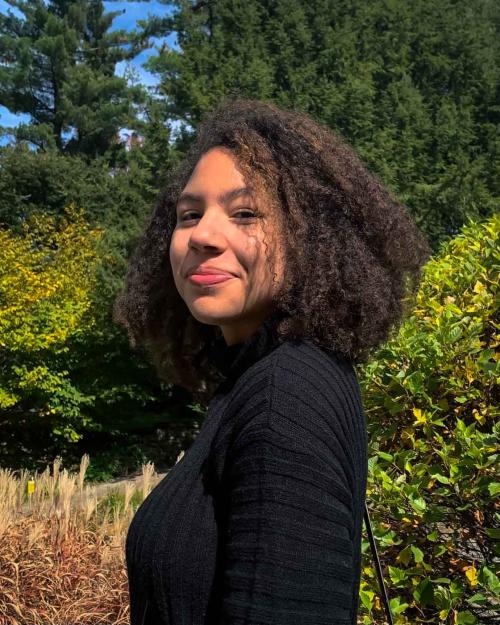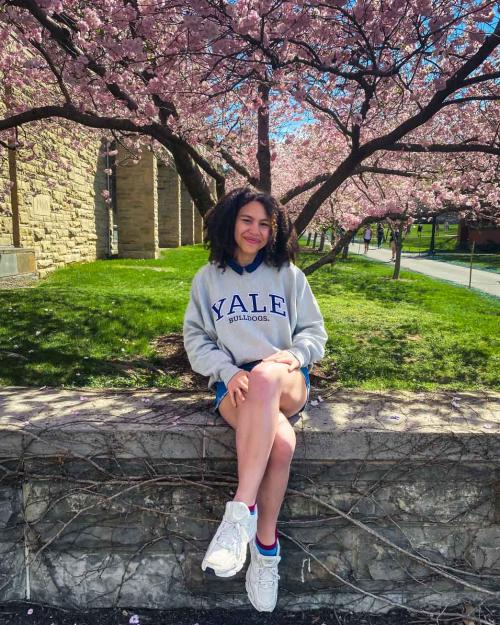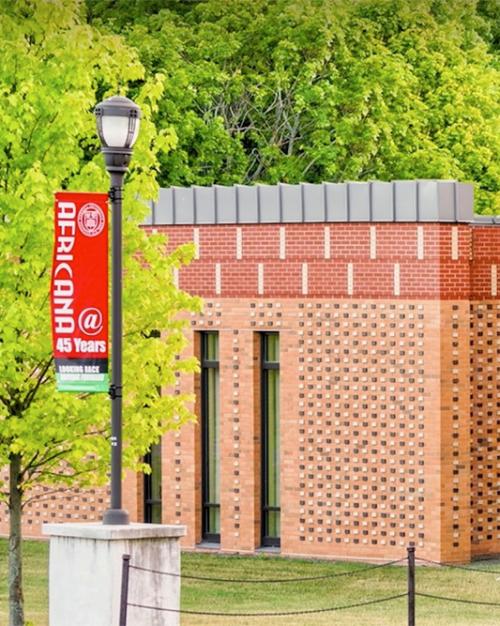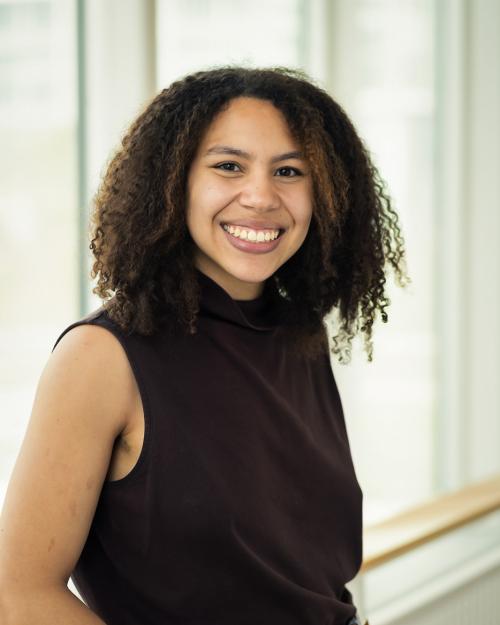Gabrielle Hill
Africana Studies & Environment and Sustainability
Minneapolis, Minn.
Why did you choose Cornell?
When I was in high school, I was being scouted to fence on varsity university teams and Cornell was one of them. I remember my visit was on an overcast, rainy day in the spring, but I was still so overtaken by the beauty of the campus and the nature that surrounded it. I remember walking through the hallway from one of the buildings that connected to Mann Library and a random professor welcoming my father and I and talking to us about the fossil specimens that were in one of the cases lining the halls. It was then that I could feel the intellectual curiosity and excitement that the school generated. I also sat in on a citizen science course — at that point I had just developed an app that allowed citizen scientists to record pollinator populations — and I was like, "These people are doing exactly what I want to do, asking the questions that I've been asking" and I just knew that this school was the place that I needed to be.
What was your favorite class and why?
I have taken so many fantastic classes at Cornell that have challenged me and shaped me as a scholar, but if I had to choose if would be ASRC 3010: Sweetness — How Sugar Changed the Modern World and ASRC 4509: Toni Morrison's Novels. "Sweetness," taught by Professor Gerard Aching, was such a transformative class for me in terms of my trajectory as a researcher. I was finally able to take a class where ecological destruction, anti-Black oppression and patriarchy were analyzed as co-constituting one another and it was incredibly validating coming from a scientific background where race and gender were seldom discussed. I was able to think through processes of racial and gender formation and ecological consciousnesses together in different parts of the African diaspora that broadened my horizons. I probably wrote some of my best papers in that class and I still refer to the readings in my research today.
Toni Morrison's Novels, taught by Professor Riché Richardson, was also a monumental class for me and I imagine for Cornell itself. It was one of the first classes I took after returning to in-person classes and it took place at the Africana Studies and Research Center, with a student population of mostly seniors and graduate students, making it a very intellectually stimulating atmosphere. All my time at Cornell, I knew Toni Morrison had graduated from here and I would think "Maybe I'm walking the halls that she once did," and such. Being able to read her novels in order of publication, discuss them deeply in a classroom setting and talk to her French editor, someone who knew her personally, was such a gift and an experience that I will treasure.
What are the most valuable skills you gained from your Arts & Sciences education?
The most valuable skills I gained from my Arts & Sciences education are the ability to persist through different situations and be resilient in the face of failure. I have learned how to advocate for myself and have internalized that my voice and perspective is an important contribution to the spaces that I am in and will enter.
What have you accomplished as a Cornell student that you are most proud of, either inside the classroom or otherwise?
I'm very proud of being admitted to a Ph.D. program right after my undergraduate experience, and also proud of my accomplishments as both an athlete and a scholar. As an athlete, I made Second-Team All Ivy my freshmen year and went on to represent Cornell at NCAA Championships my junior year. As a Mellon fellow, I have presented my scholarship at two regional conferences that allowed me to be in conversation with peers from different institutions and create a larger academic network.
Who or what influenced your Cornell education the most? How or why?
My academic mentors have been the biggest influence on my education at Cornell.
During orientation week, I met with my E&S advisor, Professor Shorna Allred, who welcomed me into the major and the larger Cornell environment. As a Black woman, I cannot tell you how life-changing it is to have a professor who shares your ancestry and history. She gave me the confidence and permission to follow my intellectual curiosity and begin to make my mark on
Black ecologies in the academy. I was and am continuously inspired by her and her work.
During my freshman year, I took ASRC 2650: Introduction to African American Literature with Professor Derrick Spires. He was the first person at Cornell who asked me if I was interested in research and getting a Ph.D., and help me apply to the Mellon Mays Undergraduate Fellowship, which was another aspect of my Cornell career that changed my life. He has been there since the beginning of my research career, encouraging me as my project has changed and grown, helping me overcome obstacles, and has contributed greatly to me being the scholar I am today, the one who is going to graduate school. I am so grateful I was able to meet him and that he's my mentor.
As I have stated before, ASRC 3010: Sweetness was such a transformation class for me in terms of my personal research trajectory. Professor Aching has been a consistent cheerleader for my research, constantly supporting me and talking me through my ideas, encouraging me to think in big, discipline-changing ways. Having the permission to have that type of intellectual freedom from a mentor is priceless and has made me a more confident scholar.
What are your plans for next year?
Next year I will be starting my joint Ph.D. in African American studies and English at Yale University.







